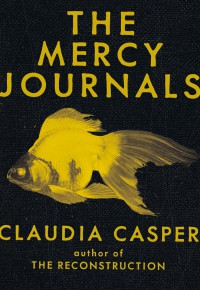
Review by Kyle Schoenfeld
The Mercy Journals
Claudia Casper
Arsenal Pulp Press, 2016
As with any book imagining a future world, Claudia Casper’s The Mercy Journals threads its way between optimism and pessimism, utopia and dystopia. It’s impossible to call the vision behind this book a utopian one—environmental destruction has caused billions of deaths and the breakdown of society—but neither is it entirely pessimistic. In Casper’s near future, material comforts are few and far between, and all the survivors carry scars from the “die-off.” But, in spite of its characters’ lingering tendencies to violence and short-sightedness, the book does not read like a cautionary tale; it is, instead, a story of finding beauty and human connections in the wake of destruction.
This ambivalence is reflected in its narrator, a former soldier nicknamed Mercy. When we meet him, he’s both physically and emotionally broken, haunted by the memory of his military service and the loss of his wife and sons. He copes with physical disability and PTSD by living the life of a “celibate hedonist,” (21) intent on day-to-day routine as a way of systematically stripping out anything emotionally resonant. Nevertheless, Mercy is supportive of the new regime (though he keeps his illegal pet goldfish) and able to reflect, “In some ways the world is more beautiful than it was before.” (115)
When the book opens, Mercy’s antiseptic routine has already been shattered. He has fallen in love with Ruby, a fellow survivor with her own share of survivor’s guilt. The eponymous journals are Mercy’s way of regaining some equilibrium in his life. The whole book is organized as a series of journal entries, but it wears this epistolary format lightly. The first half is not a day-by-day recounting but a recapitulation of the romance with Ruby, written at a time when the narrator is newly wounded and the relationship’s future is in doubt.
At the same time, his routine is further disturbed by the reappearance of his brother Leo, unreconstructed capitalist and the family’s black sheep. He convinces Mercy to join him on a journey to the old family cabin in the Vancouver Island wilderness where, he hints, Mercy’s long-missing sons might have taken refuge. The second half of the book takes us on this journey. As the two brothers—along with Leo’s stepson and a woman hiding her illegal pregnancy from the authorities—settle into their claustrophobic idyll, it becomes clear that Leo’s selfishness and Mercy’s law-abiding altruism can’t coexist forever. While Leo appears intermittently in Mercy’s first journal and the memory of Ruby haunts the second, the two halves are distinct in setting and in mood—a post-apocalyptic love story followed by a Cain-and-Abel confrontation.
Though it leaves some questions unanswered, The Mercy Journals is a successful piece of world-building. Its matter-of-fact approach—to the scale of destruction in its background, and to the harsh measures needed to keep society running—resonates with our own time, when the environmentalist cautionary tale is no longer virgin terrain and utopia may seem old-fashioned. The book is perhaps at its best when we get Mercy’s close observations of the world and the people who inhabit it. In one entry, for instance, he watches a crew launch their dragon boat among the ruins of old Seattle’s marina: “Silently, they eased the contraption down to the water’s edge and set the boat in the water. The drummer set up her drum and took her perch, the sweep positioned herself at the stern, and the rest got in and pushed off onto the grey-green water, rowing slowly backward, the sweep calling out instructions to avoid shallow-water obstacles. They disappeared in the fog. The last thing I saw was the boat’s green dragon head with its red tongue lolling out between white teeth. Then I heard the drum.” (115)
Throughout the book, Mercy’s morals remain ambiguous. He’s humane toward animals—his pet goldfish and even a wild cougar that mauls him—but at the same time he’s ready (though reluctant) to use violence against people who threaten the fragile social system they’ve constructed. He is torn between family duty and social responsibility, loyal to loved ones but willing to leave his sons in the past. “I am the kind of man whose sons are better off without him,” (113) he argues. At one point he confesses, “I think I am a good man. Still.” (88) It’s left to us to judge whether anyone in his circumstances can really make that claim.
Kyle Schoenfeld’s short fiction has appeared in the anthology This is How You Die and the journal Bricolage. He is currently pursuing an MFA in Creative Writing from the University of British Columbia.